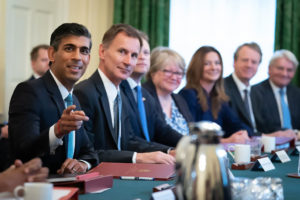When necrosis sets in, the living body starts to die. The infected parts lose their integrity, become sore and whither. It starts to spread, with further parts dropping off. If untreated, it is often fatal.
It’s hard to shake the feeling of parliamentary necrosis within the Tory party. In the last few weeks, around a dozen MPs have indicated they will be stepping down at the next election. The party is decaying before our eyes.
At every election, a few old faces and former big-wigs shuffle off the stage, but what is striking now is the youth and vigour of those announcing their early exit. Chloe Smith, Chris Skidmore, and Andrew Percy were Bright Young Things of the Cameron era and are still barely into their forties. William Wragg, elected in 2015, is 34, while Dehenna Davison, the breakout starlet of the Red Wall, is only 29. This is not the stream of usual retirements, but an exodus of some of the party’s most promising hopes for the future.
Equally, it seems like those who could form the backbone of an opposition cabinet are mulling their options. Though none has explicitly handed in their badge, Matt Hancock’s appearance on I’m A Celebrity suggests that he will be standing down, having irritated both the whips and his local association by spending a fortnight chowing down on kangaroo penis rather than attending to their political needs. Michael Gove, despite his renewed interest in housing and Levelling Up, also feels like he is easing his way to retirement.
It’s not hard to see why they might step away. Most of those who have announced they are off represent seats the Tories won on the way back to government and are likely to lose on the way down. For some, this is exacerbated by the proposed boundary changes. Fighting an electoral battle is a gruelling experience, especially when you anticipate losing comprehensively. Even if they do defy the current polling, these MPs would find themselves on the opposition benches for the first time — denied both the chance to chase ministerial briefs and to get stuff done.
The departure of so many young MPs, however, points towards the changing nature of how we see parliament — less of a vocation, more of a career choice. For much of the 20th century, those who went into parliament at a young age stayed in and around politics for life. Harold Macmillan was first elected to parliament in 1924, three decades before he reached the highest office (and more than six before he gave his final speech in the Lords). Churchill’s parliamentary career spanned 64 years, and like Macmillan he found himself losing seats before staging a comeback. On the other side of politics, Attlee served a similar time. Those who only stayed in office a term or two tended to have entered politics late, a nod to public service in their later years.
By contrast, the trend of youngish MPs returning to private life seems to be increasing. Labour’s opposition period also saw young MPs walking away, whether they were established (David Miliband) or up-and-coming (Tristram Hunt). These departures, like some of the Tory ones, were partly tied to ideological disagreements with their own side and the prospect of a long time in opposition, but also the increasing onerousness of being an MP.
A parliamentary career was once seen as a rather gilded time of public service. It appealed to the bright and young who wanted to change the world, often off the back of early success in private life, and the elder statesmen who fancied some time giving something back. Now it is a far less appealing prospect. Increasingly, constituency workloads have placed more demands on the time of parliamentarians, while social media has exposed them to new levels of abuse. The generosity of the expenses regime has been curtailed, and salaries have lagged compared to the outside world. Though still nearly three times the median wage, an MP’s pay is likely lower than an inner-London headteacher’s, never mind comparable private-sector roles.
As the incumbent party staring into the wilderness, the Tories are going to feel the brunt of this. This will be compounded by the general malaise which haunts the party; its inertia means few will feel that the party is going in their direction, or that the period in opposition will be a brief one. An early, dignified exit might well seem preferable to defeat or a lacklustre term watching Labour enjoy themselves.
This unwinding will only magnify the Conservative Party’s problems. Losing experienced MPs in winnable seats as well as those that go to Labour will increase the damage done. The Tory opposition will lack institutional memory and parliamentary experience. It’s hard to keep the government on its toes when you are still finding your feet in Westminster. Meanwhile, returning MPs will have significant sway over the post-defeat direction of the party. The narrower this group is, the narrower the road becomes.
This is not just a problem for the party, but for politics too. Poor oppositions allow poor governments to flourish without proper scrutiny. Equally, the longer it takes for the Tory party to be rebuilt (or, indeed, replaced) the more one-sided our politics may remain. It’s essential to have the balance there to hold Labour to account, and to make an active case for Right-of-centre politics. In an era where people are becoming more disillusioned with democracy, the retreat of one party could be dangerous.
In the meantime, rebuilding the parliamentary party will become even more difficult as the party’s popularity diminishes. The Conservatives have always relied on a vanguard of talented wunderkind to shape and lead the party — the post-war intake of 1950 had Heath, Macleod, Maudling (and Powell), while Clarke, Howard and the rest of the Cambridge Mafia sustained the party through the late Eighties and Nineties. Cameron and Osborne led the party back to power while still under 50, and now the mantle has passed to the youthful Sunak. Each generation brought with it a fresh energy to the political problems of the day. Now they seem to be fleeing.
Where the next vanguard comes from is unclear. The Tory vote has collapsed among younger people, with some polls suggesting the party is at single-figure support in the under-50s The party is especially struggling with the professionals it used to tempt into the parliamentary party. Failing to connect with these voters not only harms the party’s long-term electoral process but narrows the pipelines of potential MPs. At the same time, a party’s ideas are defined by its people, and the fewer young MPs the less it will be connected to the needs of those demographics.
On an individual level, the actions of these MPs are entirely rational. Their political career is likely to be ended at the next election and stepping down now is beneficial for everyone — the party has a chance to select a new candidate well in advance, and the MPs can have the pick of the best jobs they might be offered. They also get to ease away over the next year or so, spending more time with their families after years of what can be a very isolating job.
For the party, however, it feels like a symptom of hastening decline. MPs are drifting away, not even committed to the pretence that they might win. Equally, they seem to show little interest in the rebuilding project and fightback that is likely to be needed. For the rest of this parliament, it will make them harder to control, with little to fear from the games of the whips. Moreover, unless managed well, this lack of optimism will infect the bloodstream of the backbenches, making them more likely to stand down or just check-out.
As the rot sets in, more MPs will be looking to polish their CVs. Public affairs and lobbying firms will offer handsome remuneration without abusive DMs or Saturday mornings knocking on doors. Matt Hancock will likely try to follow Ed Balls and Michael Portillo into the world of inoffensive TV. It’s hard to blame them, with their lack of enthusiasm matched by many Tory members, activists and voters.
The worrying thing for the party, though, is where the infusion of new, hungry talent might come from. If the necrosis spreads too far, too fast, there will be no recovery. The Conservative Party will decompose — leaving Labour, and Britain’s voters, deprived of any meaningful Opposition.
Disclaimer
Some of the posts we share are controversial and we do not necessarily agree with them in the whole extend. Sometimes we agree with the content or part of it but we do not agree with the narration or language. Nevertheless we find them somehow interesting, valuable and/or informative or we share them, because we strongly believe in freedom of speech, free press and journalism. We strongly encourage you to have a critical approach to all the content, do your own research and analysis to build your own opinion.
We would be glad to have your feedback.
Source: UnHerd Read the original article here: https://unherd.com/




